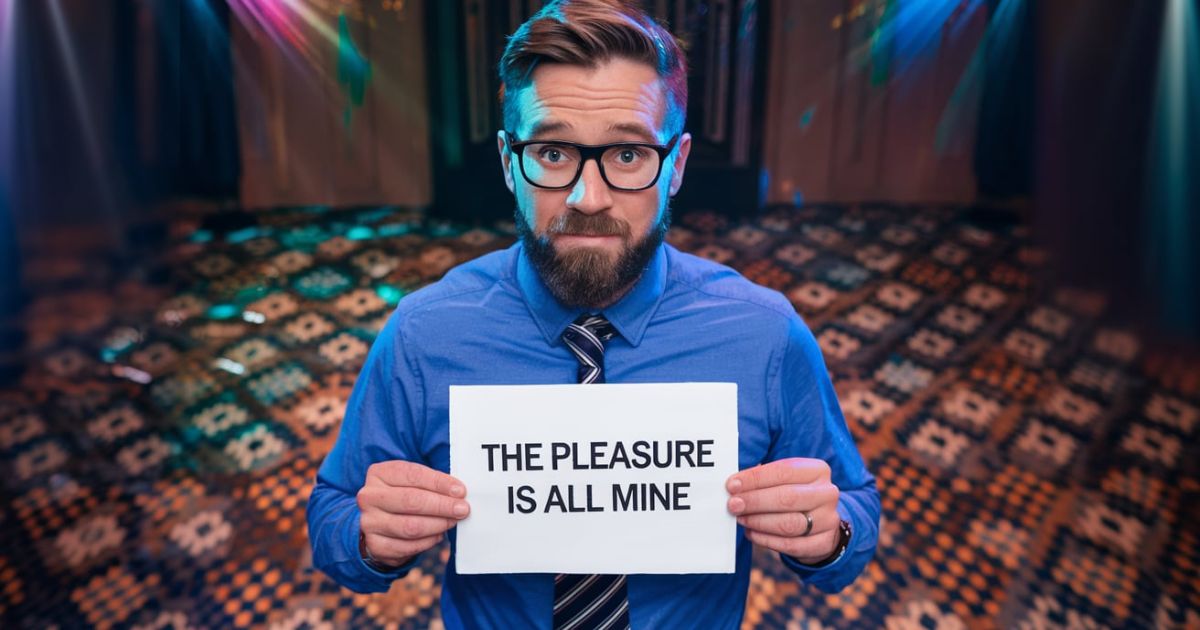In the intricate dance of social interactions, knowing how to respond graciously can make all the difference. The phrase “The pleasure is all mine” has long been a staple of polite conversation, but as with any well-worn expression, it can sometimes feel a bit stale. This article dives into 14 fresh and engaging alternatives that’ll help you express gratitude and pleasure in various situations. Whether you’re in a professional setting or a casual meetup, these phrases will add a touch of warmth and sincerity to your interactions. 14 Ways To Say “The Pleasure Is All Mine”.
Alternative Ways To Say “The pleasure is all mine”

The art of conversation often hinges on the ability to express oneself in diverse and engaging ways. While “The pleasure is all mine” is a classic response, having a repertoire of alternatives at your disposal can significantly enhance your communication skills. These variations not only prevent your responses from becoming predictable but also allow you to tailor your words to the specific context and relationship at hand.
Consider the following scenario:
You’ve just been introduced to a potential client at a networking event. After a brief chat, they say, “It was great meeting you.” Instead of falling back on the standard “The pleasure is all mine,” you have an opportunity to make a lasting impression with a more personalized response.
By expanding your vocabulary of gracious responses, you’re not just being polite – you’re opening doors to deeper connections and more memorable interactions. Let’s explore these alternatives in depth.
2. It was no trouble
When someone thanks you for a favor or assistance, responding with “It was no trouble” conveys a sense of ease and willingness to help. This phrase is particularly effective when you want to downplay the effort involved in your actions, making the other person feel comfortable about accepting your help.
Example scenario:
A colleague thanks you for staying late to help finish a project. By saying “It was no trouble,” you’re emphasizing that you were happy to assist and that they shouldn’t feel burdened by your contribution.
However, be cautious not to use this phrase when the task is genuinely challenging or time-consuming, as it might come across as insincere.
3. It was my pleasure
“It was my pleasure” is a close cousin to “The pleasure is all mine,” but it carries a subtly different tone. This phrase emphasizes your enjoyment of the interaction or task, rather than deflecting the other person’s gratitude.
When to use it:
- After a successful business meeting
- When thanked for hosting an event
- In response to gratitude for a favor
Cultural considerations: In some cultures, especially those that value modesty, repeatedly emphasizing your pleasure might be seen as boastful. Use this phrase judiciously, particularly in international settings.
4. Don’t mention it
“Don’t mention it” is a casual, friendly way to brush off thanks. It’s perfect for informal situations and can help create a relaxed atmosphere. This phrase suggests that what you did was so natural and easy that it doesn’t even warrant acknowledgment.
Appropriate situations:
- Among friends
- In relaxed work environments
- When you want to quickly move past the thanks
Potential pitfall: In more formal or professional settings, this phrase might come across as too casual or dismissive. Always gauge the level of formality required before using it.
5. It’s never a problem with you
This response goes beyond a simple acknowledgment of thanks. By saying “It’s never a problem with you,” you’re building a stronger relationship by implying that interactions or favors involving this person are always pleasant.
How it builds relationships: This phrase suggests a special rapport or connection, making the other person feel valued and appreciated.
Example:
Your friend thanks you for picking them up from the airport late at night. By responding with “It’s never a problem with you,” you’re reinforcing the strength of your friendship and your willingness to go out of your way for them.
Balancing sincerity and professionalism: While this phrase can be wonderfully warm in personal relationships, use it cautiously in professional settings to maintain appropriate boundaries.
6. I’m always happy to help
“I’m always happy to help” is a versatile phrase that works well in both professional and personal contexts. It conveys a genuine willingness to assist and can be used for both past actions and future offers of help.
Professional context: This phrase can position you as a team player and someone who’s reliable and approachable.
Personal context: Among friends or family, it reinforces your role as a supportive and dependable person in their lives.
Avoiding overuse: While it’s a positive phrase, be careful not to use it so often that it loses its sincerity. Reserve it for situations where you truly are glad to have been of assistance.
7. You deserve it always
This response shifts the focus entirely to the other person, emphasizing their worthiness of help or kindness. “You deserve it always” is a powerful way to build someone up and make them feel valued.
When this response is most impactful:
- After someone thanks you for recognition or an award you’ve given them
- When a friend is grateful for your support during a tough time
- In long-term relationships, both personal and professional, where you want to reinforce the other person’s importance
Cultural differences to consider: In some cultures, this level of praise might make people uncomfortable. Be mindful of cultural norms and individual preferences when using such effusive language.
8. I’m devoted to helping you

“I’m devoted to helping you” is a strong statement of commitment. It goes beyond a simple acknowledgment of thanks to express a deep-seated dedication to the other person’s well-being or success.
Appropriate contexts:
- In close personal relationships
- In long-term professional partnerships
- When working with clients in service-oriented professions
Balancing enthusiasm with boundaries: While this phrase can be powerful in the right context, it’s important to ensure that you’re not overcommitting or creating unrealistic expectations. Use it when you genuinely feel a strong commitment and are prepared to follow through.
9. I take all the pleasure!
This playful twist on the original phrase adds a touch of enthusiasm and personality to your response. By saying “I take all the pleasure!” you’re emphasizing your enjoyment of the interaction or task in a lighthearted way.
Scenarios where this response shines:
- At social gatherings when someone thanks you for coming
- After a fun collaborative project at work
- When a friend thanks you for a favor that you genuinely enjoyed doing
Potential for misinterpretation: In more formal or serious situations, this phrase might come across as flippant. Be sure to read the room and use it only when a touch of playfulness is appropriate. 14 Ways To Say “The Pleasure Is All Mine”.
10. You never need to thank me
“You never need to thank me” is a powerful way to express the depth of a relationship. It suggests that your actions are a natural extension of your care or respect for the other person.
Building deep connections: This phrase can strengthen bonds by implying that your support is unconditional and doesn’t require formal gratitude.
When to use and when to avoid:
- Use it with close friends and family to reinforce your commitment to them
- Avoid it in new or formal relationships where it might seem presumptuous
Cultural considerations: In some cultures, declining thanks might be seen as rude. Be aware of cultural norms and adjust your language accordingly.
11. I’d do it again
Expressing your willingness to repeat your actions in the future, “I’d do it again” reinforces the sincerity of your assistance. It shows that your help wasn’t a one-time occurrence but a genuine expression of your character.
How this phrase reinforces relationships:
- It builds trust by demonstrating reliability
- It shows that your actions align with your values
- It invites future interactions and deepens connections
Balancing sincerity with practicality: While it’s a powerful phrase, be sure you’re willing to follow through if a similar situation arises. Authenticity is key to building and maintaining strong relationships. 14 Ways To Say “The Pleasure Is All Mine”.
12. I’ll always be there to help you
This phrase conveys a long-term commitment to supporting someone. It’s a strong statement that can significantly impact your relationships, both personal and professional.
Personal use: In close friendships or family relationships, this phrase can provide comfort and reassurance.
Professional use: Be cautious when using this in a work setting. While it can demonstrate strong team spirit, it might also create unrealistic expectations.
Ensuring you can follow through: Before making such a comprehensive promise, be sure you’re in a position to honor it. Consistency between your words and actions is crucial for maintaining trust. 14 Ways To Say “The Pleasure Is All Mine”.
13. Don’t mention it
While we touched on this phrase earlier, it’s worth noting its versatility. “Don’t mention it” is a casual, friendly way to deflect thanks, similar to “no problem” or “it’s nothing.”
Contexts where this phrase works best:
- Informal settings with friends or colleagues
- Quick exchanges where you want to move the conversation along
- Situations where you want to downplay the importance of your actions
Potential for misinterpretation in formal settings: In more structured or professional environments, this phrase might come across as too casual or dismissive. Always consider the context before using it. 14 Ways To Say “The Pleasure Is All Mine”.
14. You deserve it always
We’re revisiting this phrase to highlight its unique impact. Unlike a simple “you deserve it,” adding “always” transforms this into a powerful affirmation of someone’s inherent worth.
How this phrase differs:
- It suggests a consistent, unchanging belief in the person’s value
- It can be more emotionally impactful due to its unconditional nature
Balancing sincerity with appropriate use: While this phrase can be deeply meaningful, overuse might dilute its impact. Reserve it for moments when you truly want to emphasize someone’s enduring worth.
Conclusion
Mastering the art of gracious responses is a valuable skill in both personal and professional life. These 14 alternatives to “The pleasure is all mine” offer a range of options to express gratitude, build connections, and leave a lasting positive impression.
Remember, the key to using these phrases effectively lies in choosing the right expression for the context. Consider the relationship, the setting, and the cultural background of the person you’re interacting with. With practice, you’ll develop an intuitive sense of which phrase fits best in any given situation.
FAQs
What is another way to say pleasure is mine?
While we’ve covered 14 alternatives in this article, here are a few quick options:
- “I’m delighted”
- “It’s my honor”
- “I’m grateful for the opportunity”
Remember, the best choice depends on the specific context and your relationship with the other person.
How do you say “pleasure is all mine”?
The pronunciation is straightforward: “PLEH-zhu iz awl mine”
Cultural considerations: In American English, this phrase is commonly used and well-understood. In British English, you might hear variations like “It’s my pleasure” more frequently.
When someone says the pleasure is all yours?
If someone says “The pleasure is all yours,” they’re playfully turning the phrase around. It’s usually meant humorously, suggesting that they believe they’re the ones providing the enjoyment or benefit in the interaction.
Appropriate responses:
- Laugh and agree: “You’re right, I’m the lucky one here!”
- Playfully disagree: “Oh no, I insist – at least half the pleasure is mine!”
- Acknowledge the joke and move on: “Haha, indeed. So, about that project, we were discussing…”
Is “the pleasure is mine” formal?
“The pleasure is mine” is generally considered a formal or semi-formal phrase. It’s appropriate for:
- Business settings
- First meetings
- Formal social events
For less formal situations, consider alternatives like:
- “Happy to help”
- “No problem at all”
- “Anytime!”











